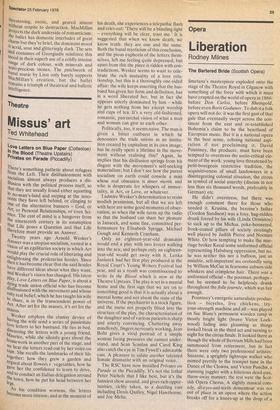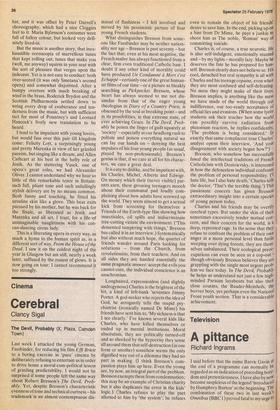Opera
Liberation
Rodney Milnes
The Bartered Bride (Scottish Opera)
Smetana's masterpiece exploded onto the stage of the Theatre Royal in Glgasow with something of the force with which it must have erupted on the world of opera in 1866: before Don Carlos, before Rheingold, before even Boris Godunov. To dub it a folk opera will not do: it was the first gust of that gale that eventually swept across the continent from the east and re-established Bohemia's claim to be the heartland of European music. But it is a national opera in the best sense, echoing national aspiration if not proclaiming it. David Pountney, the producer, must have been tempted to overstress the socio-critical element of the work: young love threatened by petit-bourgeois restrictive tradition, the acquisitiveness of small landowners in a disintegrating colonial situation, the circus as symbol of social anarchy (discuss in not less than six thousand words, preferably in German) etc.
He didn't overstress, but there was enough comment there for those who needed it. Krusina, the heroine's father (Gordon Sandison) was a foxy, hag-ridden drunk forced by his wife (Linda Ormiston) to suck up to the Michas, poke-bonneted, frock-coated pillars of society rivetingly well played by Judith Pierce and Norman White. Or how tempting to make the marriage broker Kecal some uniformed official representing Habsburg oppression, but no, he was neither this nor a buffoon, just an amiable, self-important ass orotundly sung by William McCue in fearsome auburn side whiskers and crimplene hair. There was a uniformed official — the postman, perhaps — but he seemed to be helplessly drunk throughout the folle journee, which was fair enough.
Pountney's energetic naturalistic production — bicycles, live chickens, try your-strength machine and all — was played on Sue Blane's permanent wooden ramp in mostly bright light (bravo Victor Lock wood) fading into gloaming as things lookea bleak in the third act and turning to night for the circus finale. It looked there as though the whole of Bertram Mills had been summoned from retirement, but in fact there were only two professional artistes: Suzanne, a sprightly tightrope walker who mimed prettily to the trumpet tune in the Dance of the Clowns, and Victor PoncluS, a stunning juggler with a hilarious dead-pan, throw-away manner; the rest were the Scot tish Opera Chorus. A slightly musical comedy, all-eyes-and-teeth demeanour was not out of place in an opera where the action breaks off for a knees-up at the drop of a hat, and it was offset by Peter Darrell's choreography, which had a nice Cloggies feel to it. Maria Bjornson's costumes were full of folksy colour, but looked very definitely lived-in.
But the music is another story, that inexhaustible cornucopia of marvellous tunes that kept rolling out, tunes that make you (well, me anyway) squirm in your seat with the sort of pleasure that verges upon the indecent. Yet is is not easy to conduct: both over-scored (it was only Smetana's second opera) and somewhat disjointed. After a bumpy overture with much breaking of wind in the brass, Roderick Brydon and the Scottish Philharmonia settled down to wring every drop of exuberance and tenderness from the music, but with sufficient tact for most of Pountney's and Leonard Hancock's lively new translation to be heard.
I tend to be impatient with young lovers, but would fuss over this pair till kingdom come: Felicity Lott, a surprisingly young and pretty MarenICa in view of her grizzled parents, but singing like a dream, and Allen Cathcart at his best in the hefty role of Jenik. As the stuttering Vasek, one of opera's great roles, we had Alexander Oliver. I cannot understand why we hear so little of this remarkable tenor in Britain: such full, pliant tone and such unfailingly stylish delivery are by no means common.
Both funny and touching, he fitted his ursuline skin like a glove. This bear exits pursued by his mother, but he was back for the finale, as liberated as Jenik and Marenka and all set, I trust, for a life of unimaginable naughtiness with his cancan-dancing circus lady.
This is a liberating opera in every way, as much a hymn to the human spirit as, in a different sort of way, From the House of the Dead. I saw it on the coldest night of the year in Glasgow but am still, nearly a week later, suffused by the rosiest of glows. It is now going on tour: I cannot recommend it too strongly.



































 Previous page
Previous page